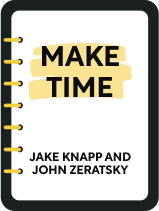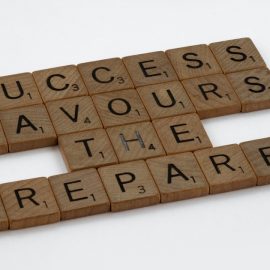

This article is an excerpt from the Shortform book guide to "Make Time" by Jake Knapp and John Zeratsky. Shortform has the world's best summaries and analyses of books you should be reading.
Like this article? Sign up for a free trial here .
Are you having trouble unplugging from technology? Is technology preventing you from living your best life?
Today’s information industry has fine-tuned its tactics to keep you checking your apps and consuming new media to where you just can’t resist it. However, this can distract you from other important things in your life.
Keep reading to learn how to unplug from technology in three easy ways.
Take Time Back From Technology
From their careers in product development, Jake Knapp and John Zeratsky speak from firsthand experience about Big Tech’s tactics in their book Make Time.
Websites, apps, and streaming services are in constant competition for eyeballs, clicks, and revenue. Unlike industries with a slower turnaround, tech developers can determine in real time how successful their strategies are. As a result, the cycle of competition has produced a system of addictive, intermittent rewards coupled with an utter lack of barriers to accessing news, games, memes, and clickbait.
The barrage of modern media is so overwhelming that it takes more than sheer strength of will to keep it at bay. The authors contend that you have to actively put barriers back in place to unplug from technology.
1. Lock Down Your Phone
The single most pernicious device that impinges on your ability to concentrate is your smartphone. Phones have completely revolutionized society by bringing great advances to our ability to communicate and access information. However, the price we’ve paid as individuals is a massive drain on our time and attention.
The authors’ first recommendation is to delete all social media apps, games, and even your email from your phone. If that’s too extreme, they suggest you turn off all notifications and remove the apps from your homescreen, forcing you to choose when to use each app. Finally, you can leave your phone behind, especially while you’re working on your Focus. Leave your phone at home, in another room, or even in a locker if one’s available. In other words, turn your phone into a tool that serves you, and not the other way around.
(Shortform note: The negative effects of smartphones may be more insidious than mere time infringement. Psychologist Jeane Twenge, who researches generational differences, has observed that children born after 2005 have experienced a sharp increase in mental health crises, including depression and suicide, coinciding with the rise of relying on their phones and social media as their primary source of human interaction.)
2. Slow Down Your Email
Many people make clearing their inbox a priority every day. This can become so overwhelming that responding to email uses up most of your productive time. While there are many jobs that require quick email responses, Knapp and Zeratsky point out that for most of us, always responding isn’t as important as you’d think. Your employer or business will benefit more if you spend your time doing meaningful work than if you squander it by reacting to random email queries. If your job is such that some communication is time-sensitive, you can set up an email autoresponse to let people know how to reach you by other means (such as your business phone).
The authors present several strategies to take control of your email time and unplug from technology:
- Only respond to email at the end of the day, when your energy is lower. (Email doesn’t require as much mental work as other tasks.)
- Create an email schedule to check two or three times per day. (This can be especially useful if you need to communicate with people in certain time zones around the world.)
- Budget your email time, using apps to lock you out if you have to.
(Shortform note: Research shows that email use negatively affects productivity and results in increased stress, especially in the case of people who mainly use email in response to computer notifications. While “batching” email time, as Knapp and Zeratsky suggest, does restore some productivity, it has no apparent effect on the amount of stress email causes.)
These practices will probably stop you from cleaning out your inbox every day. In that case, Knapp and Zeratsky advise that you set “once a week” as a more realistic goal for an empty inbox. Whichever method you choose, let your colleagues (and friends and family) know that you’re going to address email slowly, and not to expect a rapid response.
3. Turn Off Your TV
The last way to unplug from technology is to turn off your TV. This recommendation from the authors may be particularly hard to hear, because relaxing at the end of the day is so important, and we’re currently living in a Golden Age of quality TV content. However, most of us don’t realize how much time we actually give up to the TV. The authors suggest making TV an occasional indulgence, not an everyday activity.
Also, you can save money on your TV by being intentional about what you watch. If you cancel continuous streaming subscriptions, you can still rent individual movies or shows from platforms such as Amazon and YouTube, or borrow DVDs for free from your local library. Most streaming platforms make it possible to subscribe long enough to binge a series and cancel when you’re done.

———End of Preview———
Like what you just read? Read the rest of the world's best book summary and analysis of Jake Knapp and John Zeratsky's "Make Time" at Shortform .
Here's what you'll find in our full Make Time summary :
- How the current landscape is designed to steal your time and attention
- How to be proactive to take back your time
- Why we were all better off as hunter-gatherers






